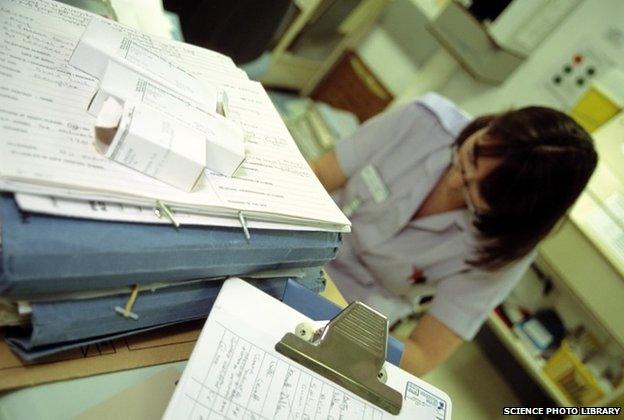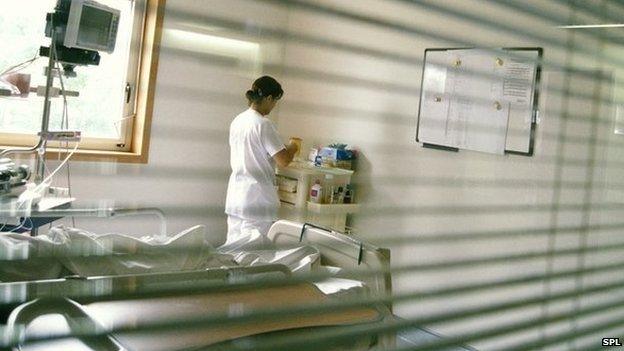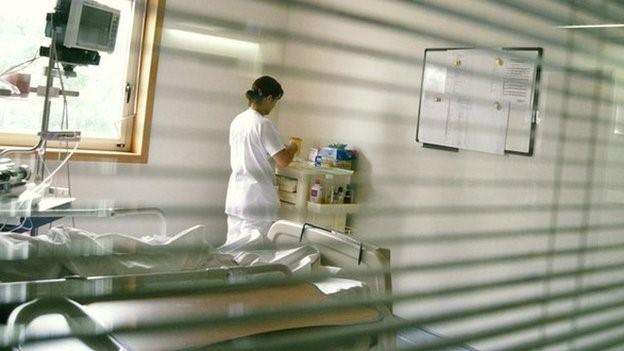More patients stuck in NHS Scotland hospitals
- Published

The number of patients having to wait longer than the target time to be discharged from hospital has risen again, according to official figures.
In October, 321 patients were delayed for more than four weeks after they were ready to go home.
The issue, known as bed blocking, has left people stuck in hospital while support arrangements are put in place.
The NHS is also continuing to miss a range of waiting time targets, including for A&E and child patients.
The four-week bed blocking target is being cut to two weeks next April.
Scotland's new health secretary, Shona Robison, said reducing delayed discharges from hospital was one of her top priorities.
The latest figures for patients delayed in hospital, external compared with 274 in July and 156 in October 2013.
Of the 321 patients included in the latest figures, 145 were waiting for a place to become available in a care home, while a further 90 were waiting to return to their own house.
The figures also showed 215 patients were delayed for more than six weeks in October this year, compared with 175 in July and 100 last October.
'Nightmare scenario'
Ms Robison said: "Reducing delayed discharge and tackling its impact on services is something I will take forward as an absolute key priority.
"That is because reducing delayed discharge not only helps individual patients, who benefit from getting home or to a homely setting as quickly as possible, but also eases pressure across the system - including in A&E.
"Although delayed discharge has been reduced by two thirds under this government, these figures show that there is still much to do."
Meanwhile, one in 10 people are waiting longer than four hours in Accident and Emergency, although more people than ever turned up for treatment.

A target to treat children with mental health problems within six months is also being missed.
Ms Robison said the "overwhelming majority" of people were receiving care within shorter timescales but accepted that more must be done.
She welcomed NHS Scotland continuing to meet the target to treat patients within 18 weeks of referral, with 90.1% of people seen within time in September.
NHS Ayrshire and Arran, NHS Forth Valley, NHS Grampian and NHS Lothian were the only health boards to miss the target.
The national standard for 98% of new attendances at A&E departments to be seen and then admitted, transferred or discharged within four hours was met for 93.5% of patients in September.
Figures show that the last time the standard was met across Scotland was September 2009, with the target hit on only eight occasions since July 2007.
Liberal Democrat health spokesman Jim Hume blamed the government for the bed blocking and waiting time delays.
He said: "With patients aged 75 and over accounting for three quarters of bed days occupied by delayed patients, it seems SNP mismanagement is failing Scotland's older people."
'Breaking point'
Mr Hume said waiting times showed "a health system creaking at the seams as a result of SNP mismanagement".
Labour's Rhoda Grant MSP said: "Bed blocking is a significant issue for Scotland's NHS, draining essential resources from a system already stretched to breaking point.
"As Shona Robison takes over from Alex Neil, she must answer Scottish Labour's call for a wholesale review of the NHS in Scotland - including the provision of social care - making sure we have an NHS fit for the 21st Century."
Jackson Carlaw, the Scottish Conservative health spokesman, said: "It's utterly unacceptable that more than 1,000 people in the last three months have been stranded in hospital when they're perfectly fit to leave.
"This is a nightmare scenario for patients and hospital managers."
He added: "The Scottish government made great play of its plan to reduce A&E attendances some years ago.
"But given we've just had the busiest September on record, it's clear that strategy has been a massive failure."
Cosla spokesman Peter Johnston said council leaders had already agreed to focus on discharge within 72 hours of people being judged clinically ready to go home.
He added: "At the same time, a commitment to reform and progressive ideals will not, in itself, deliver the improvement required.
"We will need to reflect on how we can build social care capacity to make the system work more effectively and this will require heavy investment over the next few years."
- Published26 August 2014

- Published3 December 2013
